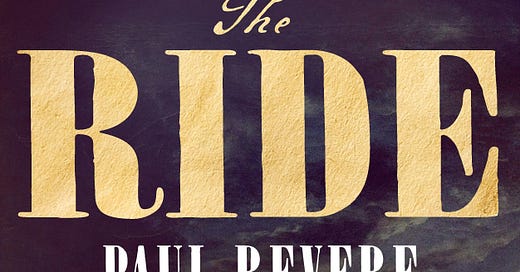“The bells a-ringing, the town’s alarmed, and you’re all dead men.”
Jonathan Loring wasn’t kidding. The officers who captured him and his companions were in hostile territory — “metro” Boston, the capital of the Province of Massachusetts Bay, where colonists had had just about enough of the Kingdom of Great Britain’s distant, and increasingly thuggish, rule.
It was time for the shooting to begin.
Late at night on April 18, 1775, and in the early hours of the following day, Lexington, and towns nearby, were warned that a column of “Regulars” was on its way. The soldiers’ objective was to capture Samuel Adams and John Hancock, and in the words of the American Battlefield Trust, seize “weapons and powder being stored in Concord.” Kostya Kennedy’s The Ride: Paul Revere and the Night That Saved America (St. Martin’s Press; 304 pages; $29.00) tells the story of why their mission failed.
America’s secession didn’t pop into existence over a trifling matter. The Ride provides the Massachusetts-based backstory, noting the area’s “tendency toward rebellion and independence that simmered even in the years when the relationship with the Crown was in the main untroubled.” Eventually, George III took it all too far, and disobedience
came to a boil through the developments that ultimately kindled the flame for revolution: the Stamp Act of 1765, which the Crown imposed with the intention of collecting a tax on the paper the colonists used, and then the Townshend Acts of 1767, which levied a tax on imports of glass, lead, and tea. The Stamp Act was soon abolished, but the suggestion of it, the insult as many colonists felt it, had been permanently lodged. Greater unrest — letters of defiance, protests on the streets — followed the Townshend Acts, which is why, in October of 1768, four thousand British troops came ashore at the Boston docks to occupy and attempt to control the city.
The Boston Massacre and Boston Tea Party escalated the standoff. So did the Powder Alarm and the raid on Fort William and Mary. Paul Revere, born in 1734, was there for all of the drama. The son of an immigrant father, his 16 children (eight with his first wife Sarah, eight with his second wife Rachel) served as a major inducement for inveterate entrepreneurship. Revere was a silversmith, engraver, dentist, bell caster, and metal manufacturer. And as “a foot soldier in the fertile field of rebellion,” he earned extra income riding for the “Committee of Correspondence, the Patriot communication network driven into action by Samuel Adams.” Tough, honest, loyal, fearless, and an excellent horseman, the cause of independence couldn’t have asked for a better messenger.
Okay, okay, you’re thinking. But did he own slaves? Kennedy is hopelessly woke, of course — non-negotiable, for any author hoping to get a book about American history published in the era of St. George of Fentanyl. But give The Ride credit for intellectual integrity. As disappointing as it must be to The 1619 Project, Revere “never enslaved anyone, nor did he ever live with anyone enslaved,” and “[n]either did the high majority of people” in his community. (In 1775, “somewhere around 1.5 percent” of the population of Massachusetts was black, and “[m]any of those people were free.” (In the early 1780s — eight decades before the Confederacy left the union — the Bay State abolished slavery.)
Wait, it gets better:
When Revere alerted the Minutemen and the townspeople across Middlesex County on the night of April 18, African American men were among those who responded. … Peter Salem from Framingham and Cuff Whittemore from Cambridge and other men, from Stoneham and Braintree and Brookline. They were willing to die in defense of a budding nation’s principles, just as the white resistance fighters were. Peter Salem would, at the Battle of Bunker Hill, have a hand in killing Major John Pitcairn of the Royal Army.
Saying or writing so might lead to placement on an FBI watchlist, but America was founded by violent insurrectionists. Paul Revere was one of them. Men died because of the information he spread 250 years ago this month. And “there’s a town and a beach named for him outside Boston; there are Paul Revere schools and academies in states from coast to coast.”
The Ride’s richly detailed account offers a dose of relief from the bleakness and self-loathing and rancor that stain the Land of the Free in the third decade of the 21st century. Where have you gone, Paul Revere? Nowhere. He, and the others who secured America’s blessings of liberty, are never more than book away.





The loss of the American colonies by the British is one of the 4 examples in Barbara Tuchman's excellent "The March of Folly." Any taxes collected by the British paled in comparison to the revenue lost when the colonies became independent. I've always wondered if the slavery issue could have been peaceably settled had we remained a British colony.